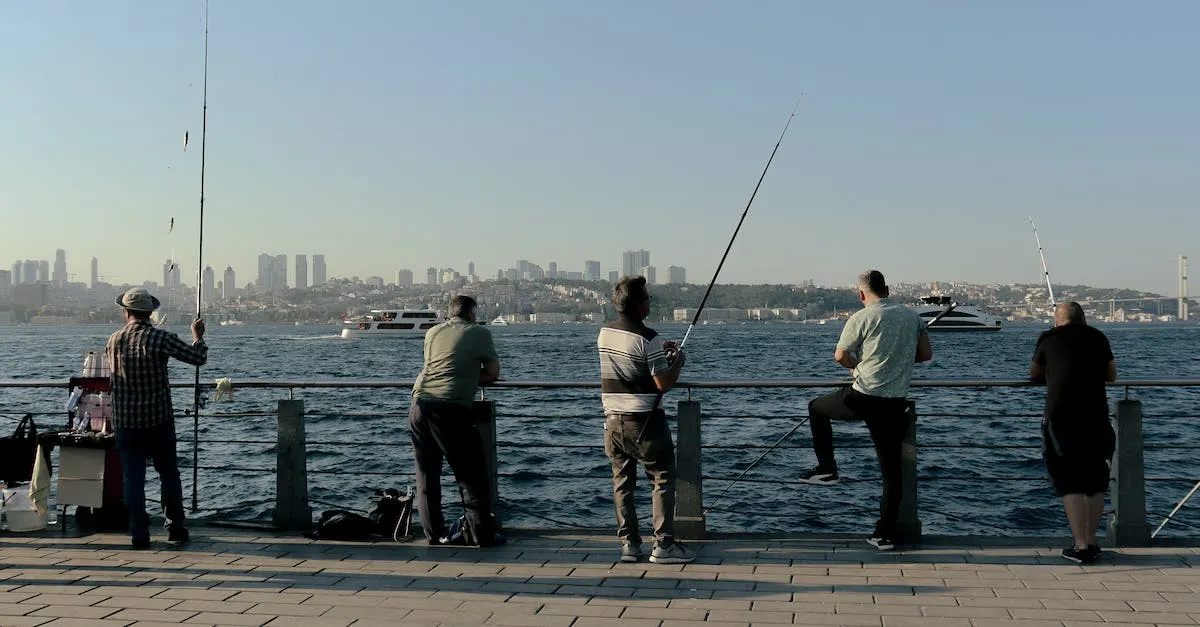Fishing Without A License In California: Rules, Exceptions, And Consequences
Casting a line into the surf and waiting for a bite is one of life’s simple joys. But before reeling in your catch, it’s essential to know the licensing rules for fishing in California.
If you’re short on time, here’s a quick answer to your question: In most cases, you need a California fishing license to fish recreationally in fresh or salt waters. There are some exceptions for youth, seniors, and disabled anglers.
This comprehensive guide will cover everything you need to know about fishing without a license in the Golden State, including:
– California fishing license requirements
– Penalties for fishing without a license
– Exceptions allowing license-free fishing
– How to legally obtain a fishing license
– Tips for responsible angling in CA
California Recreational Fishing License Requirements
Fishing is a popular recreational activity in California, attracting locals and tourists alike. However, before casting your line, it is important to familiarize yourself with the state’s fishing license requirements.
The California Department of Fish and Wildlife (CDFW) mandates that anyone over the age of 16 must obtain a valid fishing license to engage in recreational fishing.
Resident Licenses
If you are a resident of California, you have the option to purchase an annual fishing license, which is valid for one calendar year from the date of purchase. The cost of a resident license varies depending on several factors, including age and whether you choose a traditional license or a digital version.
Additionally, short-term licenses, such as 1-day and 2-day options, are available for residents who do not fish frequently or have visitors who want to experience fishing in the state.
Non-Resident Licenses
If you are visiting California from another state or country and wish to fish, you will need to obtain a non-resident fishing license. Similar to resident licenses, non-resident licenses can be purchased for various durations, including annual, 1-day, and 2-day options.
The fees for non-resident licenses are typically higher than those for residents, as they help support conservation efforts within the state.
Ocean Enhancement Validation
In addition to a fishing license, anglers who plan to fish in designated ocean waters may need to purchase an Ocean Enhancement Validation (OEV). The OEV is required for fishing in specific areas, such as certain rockfish and salmon zones, and helps fund programs aimed at enhancing marine resources.
It is important to note that the OEV is an additional requirement and must be obtained in conjunction with a valid fishing license.
For more detailed information on fishing license requirements, fees, and where to purchase them, visit the official CDFW website at www.wildlife.ca.gov/Licensing/Fishing.
Remember, fishing without a valid license can result in serious consequences, including fines and penalties. So, make sure to obtain the necessary license and enjoy your fishing adventures legally and responsibly!
Penalties for Fishing without a License in California
Fishing in California without a valid fishing license is a serious offense and can result in various penalties. The state of California has strict regulations in place to protect its fish and wildlife resources, and fishing without a license undermines these efforts.
The penalties for fishing without a license can include fines and fees, seizure of equipment, and in some cases, even jail time.
Fines and Fees
One of the immediate consequences of fishing without a license in California is the imposition of fines and fees. The exact amount of the fine can vary depending on the circumstances, such as the number of fish caught, the type of fish, and whether it is a first-time offense or a repeat offense.
In general, fines for fishing without a license can range from $100 to several hundred dollars. Additionally, individuals may be required to pay court fees and other associated costs.
Seizure of Equipment
In addition to fines, individuals caught fishing without a license in California may also face the seizure of their fishing equipment. This can include fishing rods, reels, tackle boxes, and any other equipment used for fishing.
The confiscated equipment may not be returned, and individuals may have to purchase new equipment if they wish to continue fishing legally. This can be a significant financial burden, in addition to the fines already imposed.
Jail Time
In certain cases, fishing without a license in California can lead to jail time. While it is not a common occurrence, individuals who repeatedly violate the fishing regulations or engage in other illegal fishing activities may face more severe consequences.
Jail sentences can vary depending on the severity of the offense and can range from a few days to several months.
It is important to note that the penalties for fishing without a license in California are in place to deter illegal fishing practices and protect the state’s natural resources. By obtaining a fishing license and following the regulations, anglers can enjoy their favorite pastime while contributing to the conservation and sustainability of California’s fish and wildlife populations.
Exceptions to Fishing License Requirements
Anglers Under 16
One of the exceptions to the fishing license requirement in California is for anglers under the age of 16. Young fishing enthusiasts can cast their lines without the need for a license. This exemption aims to encourage children to get outdoors, learn about nature, and develop a love for fishing from an early age.
It’s a great opportunity for families to bond and create lasting memories in California’s beautiful waters. So, if you have a young angler in your family, grab your fishing gear and head out for a fun-filled day on the water!
Seniors Over 70
Senior citizens over the age of 70 also enjoy an exception to the fishing license requirement in California. This exemption recognizes the contributions and dedication of our older generation and allows them to enjoy the therapeutic benefits of fishing without the burden of obtaining a license.
Fishing can provide seniors with a sense of tranquility, relaxation, and connection with nature. It’s a wonderful way for them to stay active, both physically and mentally, while enjoying the beauty of California’s lakes, rivers, and coastline.
Fishing on Private Property
If you are fishing on private property, you may not need a fishing license in California. However, it’s crucial to clarify the ownership and permissions before casting your line. Respect the rights of property owners and obtain their consent to fish on their land.
It’s always a good practice to communicate and build positive relationships with landowners. Remember, fishing on private property without permission is not only illegal but also disrespectful. So, if you have the opportunity to fish on private property, make sure to follow proper etiquette and regulations.
Obtaining a California Fishing License
If you plan on fishing in California, it is important to understand the regulations and requirements regarding fishing licenses. Fishing without a valid license can result in penalties and fines, so it’s essential to obtain the necessary permits before casting your line.
Buying Online
One convenient way to obtain a fishing license in California is to purchase it online. The California Department of Fish and Wildlife (CDFW) website provides a user-friendly platform that allows anglers to easily purchase their licenses from the comfort of their own homes.
Simply visit the CDFW website, follow the prompts, and provide the necessary personal and payment information. Once your transaction is complete, you will receive a digital copy of your fishing license, which you can either print or display on your smartphone while fishing.
Purchasing from a License Agent
If you prefer to purchase your fishing license in person, you can visit a licensed agent authorized by the CDFW. These agents include sporting goods stores, bait and tackle shops, and some department stores.
When visiting a license agent, make sure to bring proper identification and payment to complete the transaction. The agent will provide you with a physical copy of your fishing license, which you must carry with you while fishing.
Getting a Free Fishing Day Permit
California also offers designated “Free Fishing Days” throughout the year, during which anglers can fish without a license. These days are a great opportunity for beginners or those who want to give fishing a try without committing to a full license.
On Free Fishing Days, all fishing regulations and limits still apply, but you won’t need to purchase a license. It’s important to note that these days are limited, so be sure to check the CDFW website or contact your local CDFW office to find out when the next Free Fishing Day will take place.
Remember, fishing without a valid license is against the law and can result in fines and penalties. So, whether you choose to buy your license online or from a license agent, or take advantage of a Free Fishing Day, make sure to obtain the necessary permits before heading out on your fishing adventure.
Tips for Responsible Fishing in California
Fishing is a popular recreational activity in California, but it’s important to do it responsibly. By following the regulations and guidelines set forth by the California Department of Fish and Wildlife (CDFW), anglers can help ensure the sustainability of fish populations and preserve the natural beauty of the state’s waterways.
Here are some tips for responsible fishing in California:
Obey All Regulations
When fishing in California, it’s crucial to familiarize yourself with and abide by all fishing regulations. These regulations are in place to protect fish populations and their habitats. They include rules regarding fishing seasons, bag limits, size limits, and restricted areas.
Violating these regulations can result in fines, loss of fishing privileges, and even criminal charges. To stay updated on the latest regulations, anglers can refer to the CDFW website or contact their local CDFW office.
Monitor Your Catch Limits
It’s important to keep track of your catch limits while fishing in California. Catch limits refer to the maximum number of fish you are allowed to catch and keep within a specific time period. These limits vary depending on the species of fish and the location where you are fishing.
By adhering to catch limits, you help ensure the sustainability of fish populations and prevent overfishing. Some species may also have size limits, so be sure to familiarize yourself with the specific regulations for the fish you are targeting.
Practice Catch and Release
One of the ways anglers can contribute to the conservation of fish populations is by practicing catch and release. Catch and release involves catching a fish and then releasing it back into the water unharmed. This practice allows fish to reproduce and maintain healthy populations.
When practicing catch and release, it’s important to handle the fish carefully and minimize stress. Use barbless hooks, wet your hands before handling the fish, and release it quickly and gently. By practicing catch and release, you can help ensure the future of fishing for generations to come.
Remember, responsible fishing not only benefits the environment but also enhances the overall fishing experience. By obeying regulations, monitoring catch limits, and practicing catch and release, anglers can enjoy the thrill of fishing while contributing to the conservation of California’s aquatic resources.
Conclusion
California offers world-class fishing, but enjoying it legally and sustainably means understanding licensing requirements. Get up to speed on the rules, carry your license, and focus on the serenity of the sport – not stress over steep penalties.
With some preparation and common sense, you can cast your line into Golden State waters confidently. Just make sure to buy your license and follow all regulations – that prize catch will be even sweeter knowing you fished responsibly!








